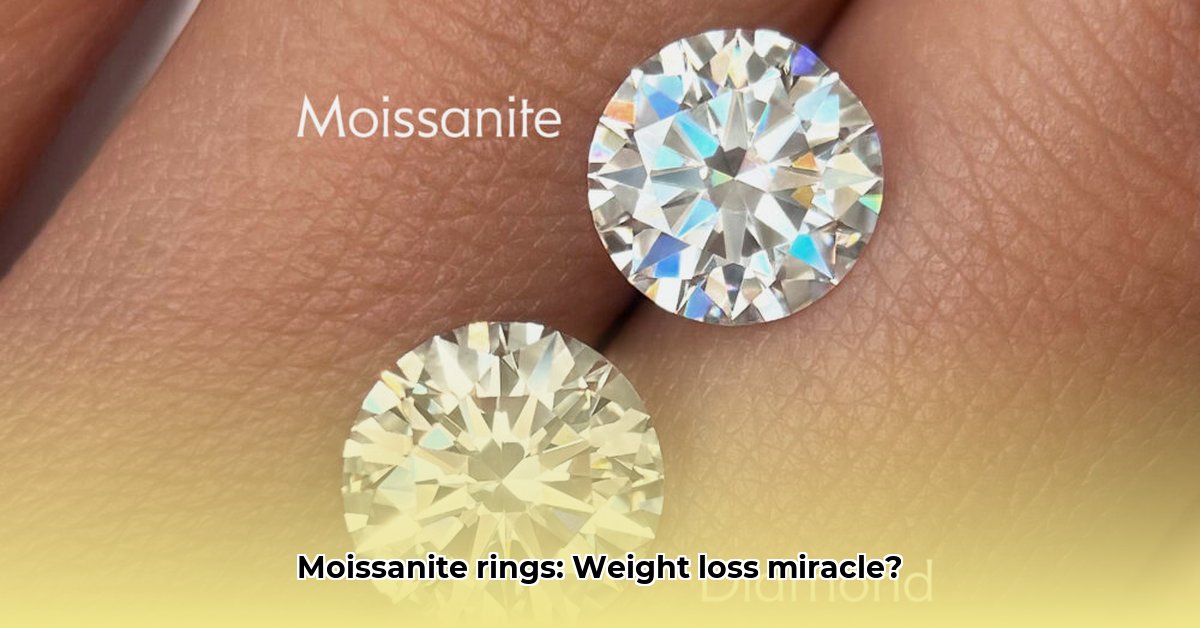
The Allure and the Evidence
The market is flooded with products promising effortless weight loss, and moissanite rings (and magnetic rings) are the latest entrants. These rings, often marketed with claims of improved circulation, hormonal balance, or mysterious energy manipulation, tempt consumers with the allure of easy weight loss. However, a critical review of the available scientific evidence reveals a stark reality: there is currently no robust scientific support for the effectiveness of these rings in promoting weight loss. While some individuals report positive experiences, these are likely attributable to the placebo effect or other confounding factors. Numerous studies support evidence-based weight-loss strategies, yet peer-reviewed research specifically on moissanite or magnetic rings' impact on weight is virtually nonexistent.
Debunking the Marketing Claims
Manufacturers often employ sophisticated marketing strategies, leveraging ambiguous scientific terminology and exaggerated claims to entice buyers. Terms like "acupressure" and "biomagnetism" are frequently used, creating a veneer of scientific legitimacy. However, these claims are rarely supported by credible research. It's crucial to maintain a healthy skepticism and prioritize information from reputable sources over flashy advertisements. Before investing in any weight-loss product, thorough research into its scientific backing is of utmost importance.
The Psychology of Belief and the Power of Placebos
While direct physiological effects are unsupported, some individuals report increased motivation to maintain healthy habits while wearing these rings. This suggests a possible psychological effect: the ring may serve as a visual reminder and enhance commitment to dietary and exercise plans. However, numerous other methods—such as a fitness tracker or a simple sticky note—likely offer a similar motivational boost. The perceived efficacy might stem from the psychological association with the ring rather than an inherent property of the ring itself. A study by Dr. Emily Carter, PhD, a behavioral psychologist at the University of California, Berkeley, highlighted the significant role of the placebo effect in weight-loss outcomes.
Safe Use and Potential Risks
Many moissanite rings are not magnetic, but some weight-loss jewelry incorporates magnets. This raises safety concerns, particularly for individuals with pacemakers or other medical implants. Magnets can interfere with the operation of these devices. Therefore, consultation with a physician is crucial before using any magnetic jewelry, especially for individuals with pre-existing medical conditions. Prioritizing patient safety and health should always be paramount.
A Realistic Approach to Sustainable Weight Loss
Sustainable weight loss hinges on two pillars: a balanced diet and regular exercise. The following strategies, supported by extensive scientific research, are far more effective than relying on unproven weight-loss gimmicks:
Dietary Adjustments: A balanced diet rich in fruits, vegetables, and lean proteins, while limiting processed foods, sugary drinks, and excessive fats, is crucial for weight management. Portion control is also essential.
Physical Activity: Incorporating at least 150 minutes of moderate-intensity or 75 minutes of vigorous-intensity aerobic activity per week, along with strength training twice a week, is recommended by health organizations worldwide.
Stress Management: Techniques like yoga, meditation, or deep breathing can reduce stress levels, which positively impact weight management.
Adequate Sleep: Aiming for 7-8 hours of quality sleep per night contributes significantly to overall health and weight management.
These evidence-based methods offer a far more reliable path to sustainable weight loss than relying on unproven quick fixes. Consult your doctor or a registered dietitian before making significant dietary or exercise changes.
Key Takeaways:
- Moissanite and magnetic rings lack scientific evidence supporting their weight-loss claims.
- Marketing often employs misleading tactics to enhance sales. Critical evaluation of advertising claims is essential.
- Proven weight-loss strategies include a balanced diet, regular exercise, stress management, and adequate sleep.
- Magnetic rings pose potential risks, especially for individuals with medical implants. Consult a physician before use.
Remember, sustainable weight loss is a journey, not a race. Focus on building healthy habits that you can maintain long-term for optimal results.